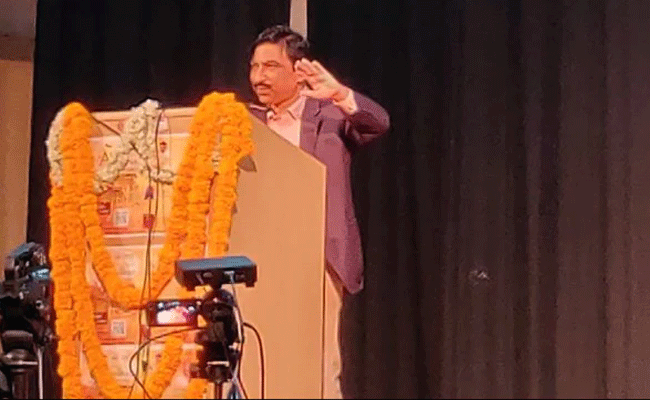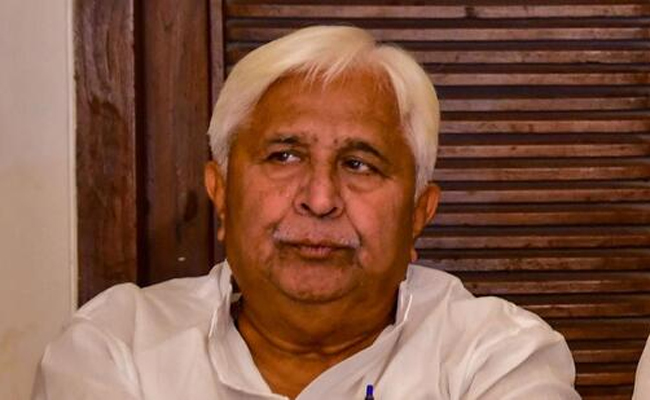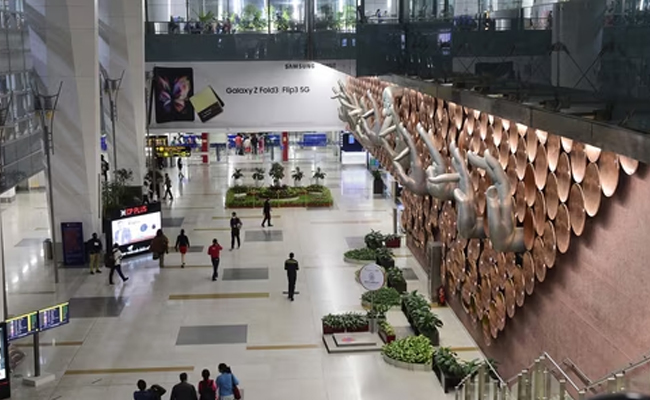New Delhi (PTI): Archaeologist K K Muhammed, who claims to have first witnessed the remains of a Ram temple under the Babri masjid in Ayodhya, has alleged in a book that the ASI became "a wholly-paralysed body" after 2014, a charge strongly rebutted by former Union culture minister Mahesh Sharma.
Sharma has also warned of "necessary action" against the archaeologist, who was part of the first excavation team led by Professor B B Lal at Ayodhya in 1976-77.
K K Muhammed had for the first time acknowledged in 1990 through a newspaper article that he had witnessed the remains of a Ram temple under the mosque.
He was awarded the Padma Shri in 2019 after the Bharatiya Janata Party (BJP) returned to power at the Centre for a second consecutive term.
In his recently-released autobiography titled "An Indian I Am", he has written that the Archaeological Survey of India (ASI) has been reduced to a "paralysed body" during the first seven years of the BJP rule.
Asked about the allegation, Sharma, who was the Union culture minister from November 9, 2014 to 30 May, 2019, told PTI: "I have gone through the book. I am reviewing it. I will take necessary action."
The archaeologist has also alleged that when the saffron party came to power in 2014, it reduced the financial powers of the superintending archaeologists from Rs 25 lakh to Rs 3 lakh, due to which they could not carry out any conservation work of monuments and temples and looked at the head office in Delhi for every little thing.
An email sent by PTI on the issue to V Vidyavathi, Director General, ASI, is yet to be responded. When contacted, Vasant Kumar Swarnkar, Public Relations Officer (PRO), ASI, refused to comment on the matter.
Government experts, who were part of the decision to reduce the financial powers of the superintending archaeologists, said it was done with a good intent to bring accountability among the engineers and archaeologists and later on, when it was realised that it did not work out, the decision was reversed.
Rakesh Tiwari, who served as the ASI's DG from 2014 to 2017 during which the decision was taken, said, "I agree that due to the reduction of (financial) power, there was a delay in the approval process of conservation and restoration of projects. However, it is incorrect to say that no conservation work happened at all."
A section of senior archaeologists has also alleged an autocratic and over-centralised administrative setup in the ASI.
Former ASI director for monuments and world heritage N Taher said, "After working for more than three decades in the department from the late 1980s to pre-2020, we have seen the transition or transformation in the status of the ASI in the people's perception from a premier institution to a secondary or subsidiary institution."
He said this, in his opinion, could be "ascribed to the mismanagement of the ASI's manpower and resources due to its autocratic and over-centralised administrative setup, and not working on a project mode within the country as opposed to the successful implementation of projects abroad".
In his book, K K Muhammed has suggested various ways to make the ASI a profitable body and compared the tenure of various culture ministers, starting from the period when Atal Bihari Vajpayee was the prime minister.
He has described Jagmohan's tenure as the culture minister as the "golden period" of the ASI due to the "all-round development" it ensured.
"When Narendra Modi came to power, riding on the wave of popular sentiments, what the general public expected was a repeat of what they had seen during the period of Jagmohan," he said.
"Culture lovers all over the country were hoping to see a sea of change in the field of culture but it proved to be a magnificent illusion because the financial power of the superintending archaeologist was reduced from Rs 25 lakh to Rs 3 lakh and the rest of the power was concentrated in the central office in Delhi," he said.
The archaeologist said he himself reconstructed 80 temples at Bateshwar in the hostile terrain of the Chambal region in Madhya Pradesh during the Congress's government at the Centre, using his financial power of Rs 25 lakh.
"It is painfully noted that during the last seven years of the BJP rule, not a single temple has been reconstructed at Bateshwar," he wrote.
"It is a strange irony of fate that the ASI was suddenly pushed into this state of paralysing paranoia during the period of the BJP, which used to boast of the glorious civilisation of the country," the archaeologist wrote and went on to describe this period as a "dark age" for the ASI.
In August 2020, the Centre restored the financial power of the superintending archaeologists.
K K Muhammed has also alleged that the ASI outsourced non-conservational work such as the construction of boundary walls, pathways, toilets etc. to public construction companies that charged higher prices, whereas the ASI used to do it on a shoestring budget.
"While structural conservation and temple reconstructions were reduced to a minimum, toilet complexes consisting of a ticket counter, a cafeteria and souvenir shops at exorbitant costs were constructed at many monuments where such amenities are not required at all," he has written.
He said the current DG has realised the problem and started taking an initiative not to allow these organisations to further exploit the ASI.
Summing up the seven years of the BJP rule, he wrote: "This period would go down in the history of the ASI as the most unfortunate period during which all those who imposed these toilet complexes knew the cost of toilets and cafeterias but not the value of temples and monuments."
Let the Truth be known. If you read VB and like VB, please be a VB Supporter and Help us deliver the Truth to one and all.
By Suman Rodrigues & Ismail Zaurez
Shiroor, Udupi: The Ministry of Road Transport and Highways had made it clear as far back as 1996. An order was issued by the ministry in 2016 that all speed breakers put up by local authorities on national highways must be removed. A similar order was again issued in 2021. The reason was simple. National highways are meant to allow smooth, uninterrupted movement of vehicles at higher speeds, and unscientific humps turn them into accident zones. Since then, the ministry has repeated this direction several times. Yet, nearly a decade later, the same warning appears to have been ignored on National Highway-66 in Udupi district.
At Shiroor Pette on the Byndoor–Karwar stretch of NH-66, the violation is hard to miss. Motorists encounter a sudden and poorly designed speed humps with on both sides of the highway, there are no reflectors installed, and no advance markings in place. A raised patch of road appears out of nowhere on a national highway where vehicles are legally moving at around 80 kmph. The danger increases at night, as this stretch has no streetlights, a problem seen across several National Highway sections along Karnataka’s coastline, where long patches remain unlit.
For those driving along the coast, the experience is jarring. One moment the road is smooth, the next the vehicle hits a hump so abrupt that drivers are forced to slam brakes or lose control. Motorists travelling regularly on this stretch say this is not an isolated issue but a pattern, with Shiroor emerging as a prime example of how unsafe interventions are creeping onto the national highway.
The concern is not just inconvenience. It is about safety. Rules framed by the Ministry of Road Transport and Highways clearly prohibit speed breakers on national highways. The ministry’s policy states that humps are a safety hazard and defeat the purpose of a high-speed corridor. Where speed control is unavoidable, such as at junctions or accident-prone locations, the prescribed alternative is properly designed rumble strips, not humps.
Despite this, NH-66 in Udupi has seen the appearance of multiple humps. At Gangoli Cross near Kundapura, there are three sets of four humps within a distance of just ten metres. What makes the situation more glaring is that similar stretches of NH-66 in neighbouring Dakshina Kannada and Uttara Kannada districts do not have such humps. The difference is not the highway. It is the administration.
When Vartha Bharati contacted officials linked to highway management and local administration, the response was a familiar one. Denial, deflection, and passing the blame.
The Project Director of the Honnavar Project Implementation Unit, Shivakumar said the humps were put up by the local police station after being identified as accident-prone spots by the Road Safety Committee, which is chaired by the Deputy Commissioner. He said humps are not allowed on national highways but claimed temporary measures may be taken in areas with repeated accidents. He added that if the humps were found hazardous or unscientific, they would be removed.
He also said MP Kota Srinivas Poojary had called and requested that the humps be implemented, and that after a letter from the police, permission is sought from safety consultants of the National Highways Authority of India. According to him, this was only a temporary safety measure.
However, the local police station flatly denied erecting the humps. The Byndoor Circle Inspector Shivakumar B, said the police only identify blackspots based on set criteria and do not construct humps. According to him, decisions on what action to take are left to the road safety committee.
Udupi Superintendent of Police Hariram Shankar said the matter would be conveyed to the highway authority. He stated that police generally suggest rumble strips and that in extreme accident cases, civil engineers of NHAI decide on measures, including humps.
An official at the Shiroor toll plaza that is barely a couple of kilometers from these humps said the humps had been erected about a month ago after an autorickshaw driver died at the spot in an accident.
When the Project Director was again asked whether any letter had been received from the Deputy Commissioner or other authorities directing the erection of humps, he said no such letter had come and asked this reporter to check with IRB.
Manoj Naik, an official of IRB Infrastructure Developers Ltd, which operates the Karwar–Kundapura stretch under a Build-Operate-Transfer contract, said the humps were erected following instructions from the police. He said the location had been marked as a blackspot.
When asked who permitted the humps, he said they would add bitumen, paint markings and install cat’s eyes, and that the hump would then be “fine”. He said the Deputy Commissioner’s office had asked for barricades and a hump, even though MoRTH rules do not allow humps on national highways.
More seriously, he alleged that the company was pressured to put them up. He said they were told that cases would be registered against them if accidents continued. According to him, these instructions were oral, while the official letters only spoke about “safety measures”.
When asked about the absence of reflectors and warning signs, he said they would be added later. He also blamed motorists, especially truck drivers, for overspeeding, and said even those who built the road found it difficult to cross because of speeding vehicles.
However, letters accessed by Vartha Bharati tell a different story. The communication from the Deputy Commissioner’s office to NHAI and IRB does not mention humps at all. It only asks for safety measures, including rumble strips. A letter from Theme Engineering Services Pvt. Ltd., the consultancy agency appointed as the Independent Engineer for consultancy services during the Operation and Maintenance of the stretch of the highway, states that safety measures had already been provided at the location.
When asked why these “measures” included humps, which are not permitted on national highways, officials from the consultancy avoided calls seeking clarification.
When contacted, Udupi Deputy Commissioner Swaroopa T.K. was completely unaware of the humps that were erected on the national highway supposedly by the committee that is chaired by her. She however, said the issue will be reviewed in the next road safety committee meeting.
“We will look into that. After removing the hump, as per NHAI codes, we will take appropriate action in this regard,” she added.
What emerges clearly is not a safety plan but a blame game. Every authority points fingers at another. No one takes responsibility. No one produces a clear written order authorising the humps.
This is despite clear guidelines and repeated judicial directions. Based on MoRTH policy and directions arising from road safety proceedings, including those monitored by the Supreme Court of India, speed breakers on national highways are strictly prohibited. The policy mandates removal of unscientific and unauthorised humps and requires that any rumble strips must be approved by the Chief Engineer or authorised officer of NHAI or NHIDCL, and must comply with Indian Road Congress standards. Even in recent years, the Supreme Court has continued to push for strict enforcement of these norms.
In the rush to show action after accidents, authorities in Shiroor appear to have created a new danger. A sudden hump on a high-speed highway does not just threaten motorists. When drivers lose control after hitting an unexpected obstacle, vehicles often swerve towards the very spot where pedestrians wait to cross.
What this really means is simple. In the name of pedestrian safety, an already risky stretch has been made more dangerous for everyone. Until accountability is fixed and rules are followed, NH-66 in Udupi will remain a highway where safety decisions are made in haste, without science, and without anyone willing to own them.





